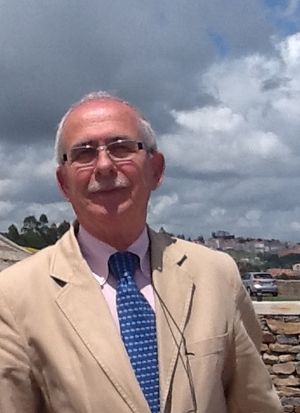Francisco García Tortosa facts for kids
Francisco García Tortosa was a famous Spanish professor, writer, and translator. He was born in La Ñora, Murcia, Spain, on September 15, 1937. He passed away in Seville, Andalucía, Spain, on May 19, 2024.
Professor García Tortosa was known as one of the top experts on the Irish writer James Joyce. He translated many of Joyce's books into Spanish. He also wrote many studies about Joyce's work. The Irish writer Ian Gibson called him "Spain's leading expert on Joyce." Gibson also said his translation of Joyce's book Ulysses was "amazing."
Contents
Life Story of Francisco García Tortosa
Early Life and Education
Francisco García Tortosa grew up in La Ñora, Murcia, Spain. His first school was in an old army hut. This hut was used by the Air Force during the Spanish Civil War. Jesuit priests, who lived in the town's monastery, ran the school. Later, he went to high school in Cehegín and Murcia.
He then studied at the University of Salamanca. In 1965, he earned his degree in Modern Philology. This means he studied languages and literature. In 1970, he earned his Ph.D. (a very high university degree). His Ph.D. paper was about "Imaginary Journeys in the English Eighteenth Century." For his research, he spent time at the British Museum in London.
Teaching Career and Roles
From 1964 to 1968, Professor García Tortosa taught Spanish in London and at the University of Leeds. He became a full professor at the University of Santiago de Compostela in 1973. In 1976, he moved to the University of Sevilla, where he taught until 2008. After that, he was a Professor Emeritus until 2011. This means he was a retired professor who still had an important role.
He gave many important talks and courses at universities across Spain. He also lectured in other countries. These included places like University College, Dublin, the James Joyce Centre in Dublin, and universities in the United States.
During his career, Professor García Tortosa helped 32 students earn their Ph.D. degrees. Many of these studies were about James Joyce. He also held many important positions. He was the director of the Institute of Languages at the University of Sevilla. He also helped start the Spanish Association of Anglo-American Studies. In 1992, he founded the Spanish James Joyce Society. He was its president for life.
Professor García Tortosa also wrote for major Spanish newspapers. These included El País, El Mundo, and ABC. He had three children. Francisco García Tortosa passed away in Seville on May 19, 2024, at the age of 86.
Professor García Tortosa's Work
Focus on James Joyce
Professor García Tortosa's work had three main parts: teaching, writing about literature, and translating. Most of his work focused on James Joyce. He studied Joyce's books and how they related to Spain. Experts say his article "Spain in Joyce" was a very important study. It showed how Spain influenced Joyce's writings.
Other experts have said that Professor García Tortosa was a "pioneer" in English studies in Spain. They noted that his work helped make these studies stronger in the country. His biggest impact was in helping students with their advanced degrees.
Translating Joyce's Books
Professor García Tortosa was very important for Joyce studies in Spain. He was one of the first to understand how important it was to study how books change over time when translating them. His translations of Ulysses and "Anna Livia Plurabelle" helped many Spanish readers enjoy Joyce's work.
A professor named Javier Aparicio Maydeu praised García Tortosa's edition of Ulysses. He said it made the book easy to get and understand for Spanish readers. Another writer, Jenaro Talens, said his translation was very accurate. He also said it kept the "musical rhythm" of Joyce's English writing.
García Tortosa on Joyce's Books
Understanding Joyce's Writing
In an interview, Professor García Tortosa explained why Joyce's books can be hard to read. He said: "The difficulty with Joyce is that you need to be very realistic. If you meet someone, they don't tell you everything at once. Slowly, over time, they show you more about themselves. Even then, it's only a little bit, and sometimes it's confusing. This is how it is in Joyce's books." He believed readers should approach Joyce's work like they approach real life.
Challenges of Translating Joyce
Translating Ulysses was a huge challenge for him. He said it was like an "odyssey" (a long, difficult journey). A translator needs to solve many problems. They also need to know a lot about art, philosophy, and science. The hardest part, he said, was making sure the Spanish version had the same hints, echoes, and unclear parts as the original.
He believed a good translation should not explain too much. It should keep the unclear parts just as they are in the original book. He said: "In a book like Ulysses, the translator often wants to make it easier to read. But if we do that, we would change what the author wanted."
More recently, Professor García Tortosa became very interested in Joyce's book Finnegans Wake. He wrote many articles about this difficult book. He said that its style was a natural next step from the "Circe" part of Ulysses.
See also
 In Spanish: Francisco García Tortosa para niños
In Spanish: Francisco García Tortosa para niños
 | Aaron Henry |
 | T. R. M. Howard |
 | Jesse Jackson |


